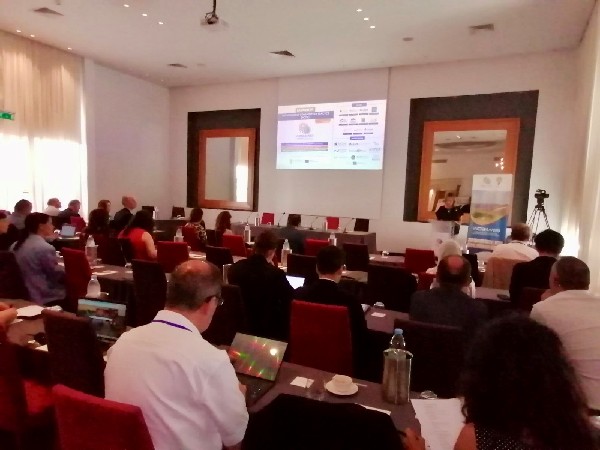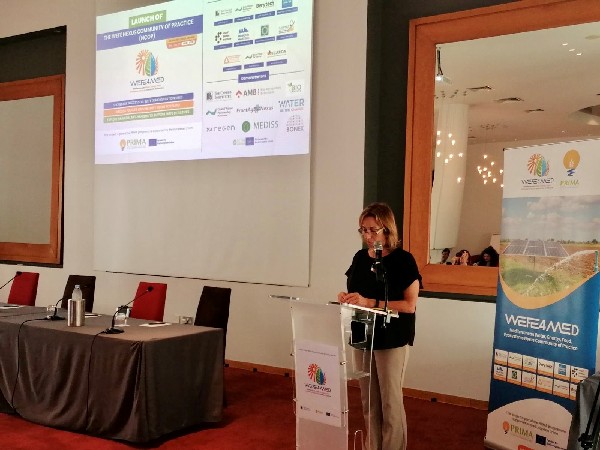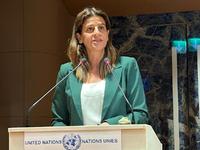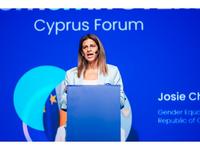Press Releases
25-09-2024 11:36
Opening address of the Commissioner for the Environment, Ms Antonia Theodosiou, to the Launch of the Water, Energy, Food, Ecosystems (WEFE4MED) Nexus Workshop, organised by the Cyprus Institute
Ladies and Gentlemen, esteemed participants,
It is both an honour and a privilege to address the launch of the Water, Energy, Food, Ecosystems (WEFE) Community of Practice (NCoP) Workshop, here, in Cyprus. I would like to take this opportunity to extend my personal thanks to Prof. Stavros Malas, President of the Cyprus Institute for his kind invitation on behalf of the consortium of the PRIMA project WEFE4MED. The Institute, in partnership with the PRIMA Foundation, play a leading role in Cyprus in promoting the Nexus approach in Cyprus, an initiative that is essential for building a more resilient, secure, and sustainable future, safeguarding critical resources, promoting economic stability, and addressing environmental challenges in a rapidly changing world.
As we gather today, we face the shared climate challenges of the broader Mediterranean region; a region of both rich cultural and environmental heritage, yet one marked by increasing fragility. Cyprus, like its Mediterranean neighbours, is under immense pressure, and we find ourselves at a pivotal moment. Sustainable management of our water, energy, food, and ecosystems –severely impacted by climate crisis– is no longer a choice but a necessity for our survival.
As we are well aware, the struggle for resources is, already in some cases, a source of conflict worldwide. The Mediterranean region faces growing pressures due to the escalating effects of climate crisis, demographic shifts, and geopolitical instability. These pressures will continue to grow, making it crucial that the solutions we adopt, in how we deliver water, energy and food to all, in a sustainable and equitable manner, while preserving the health of natural ecosystems, address the intricate interconnections between these sectors.
Water is essential for the entire agro-food supply chain, yet farming practices may sometimes harm water quality. Water is also crucial for generating energy, while energy is needed to extract, distribute, and treat water, such as in the case of desalination.
Energy, too, is vital across the agro-food supply chain, from pumping water to processing, transporting and refrigerating food. Similarly, healthy ecosystems are critical for the sustainability of all sectors but can be degraded by unsustainable resource use.
Cyprus, in particular, faces major challenges related to water, energy, and food security; challenges compounded by the island’s geographic limitations, overuse of its natural resources, and, of course, the accelerating impacts of climate change.
One of the most pressing concerns is water scarcity. Cyprus is one of the driest countries in Europe, and prolonged droughts and irregular rainfall patterns have placed immense strain on our water resources. To mitigate this, we have constructed a large number of dams to capture and retain the limited freshwater resources we receive. However, this is not solely an issue of water supply for drinking or for farming use. Water scarcity has significant implications for energy production, ecosystem health, and sectors such as tourism, an important economic sector that relies heavily on extensive irrigation for golf courses and resort developments.
The agriculture sector, which plays a vital role in our economy and food security, is a major consumer of both water and energy. Cyprus’s agriculture is highly dependent on irrigation, accounting for 70% of total water consumption, with the exception of rainfed or dryland crops that are also vulnerable to prolonged droughts. This dependency creates significant vulnerabilities in our food systems as water becomes scarcer. Rising temperatures and more frequent extreme weather events are already impacting crop yields, posing a threat to food security.
Furthermore, unsustainable agricultural practices not only deplete water supplies, but may also degrade soil quality and biodiversity. Shifting towards more sustainable methods, such as adopting efficient irrigation technologies, integrating recycled water supply, and promoting soil conservation practices, can help partially alleviate this pressure. However, these efforts must be accompanied by a broader rethinking of how we manage our resources, especially in times of scarcity.
In terms of energy, Cyprus remains heavily dependent on imported fossil fuels, which not only makes the country vulnerable to fluctuating global energy markets but also contributes significantly to greenhouse gas emissions. This reliance on conventional energy sources hampers the transition to a greener economy and places additional strain on our water resources, which are already scarce. The transition to renewable energy is not just an environmental necessity; it is also an economic imperative.
Fortunately, Cyprus is blessed with abundant sunshine, providing us with a great potential to harness solar energy as a sustainable alternative. Yet, despite this potential, our shift towards renewables has been slow, limiting our ability to reduce carbon emissions and conserve water. However, there has been progress. Electricity generation from renewable energy sources (RES) has steadily increased, reaching approximately 18% in 2022, with a target of at least 23% by 2030. As part of the broader energy transition strategy, Cyprus initially relied on natural gas as a temporary solution, as it emits fewer pollutants than heavy fuel oil and addresses the current challenges of storing energy from RES.
Cyprus’s Ministry of Energy is now advancing significant measures to boost RES penetration, including the introduction of regulatory frameworks for energy communities. This will enable citizens, along with private and public entities, to participate in energy production, distribution, consumption, and storage in collaboration with Local Authorities. Such initiatives are crucial not only for environmental protection and tackling climate change but also for moving towards a fossil-fuel-free economy. Most importantly, these synergies foster civil engagement, allowing communities to shape the energy transition in ways that best align with their needs, goals, and aspirations.
As described above, these challenges rooted in the interdependence of water, energy, and food production, highlight the need for the WEFE Nexus approach. By addressing this interdependence and moving beyond traditional sectoral thinking, the Nexus approach offers a path towards overall security and sustainability of all resources, ensuring that efforts in one sector do not jeopardize progress and security in another.
The challenges are of course immense, but they are not insurmountable. With initiatives like the WEFE Nexus approach, we can create synergies between sectors that were once seen as competing. This collaborative, integrated approach is precisely what we need to tackle the complex problems of our time, offering numerous advantages across sectors:
It enhances the long-term viability of economic activities, builds resilience to climate change, reduces risks and costs from natural disasters, and increases resource-use efficiency, particularly in agriculture and tourism. Additionally, it promotes more efficient resource use, better infrastructure management, and fosters innovation and trade optimisation.
By aligning with the United Nations Sustainable Development Agenda, the Nexus approach promotes public health, job creation, access to clean water, and the restoration of ecosystems and habitats, ensuring a healthier environment.
It fosters collaboration in managing shared resources, leading to cross-border agreements, shared regulations, and increased investments, contributing to regional stability and cooperation in the region.
Here, in Cyprus, we have already taken steps towards a more sustainable future. Our government is actively pursuing water-saving technologies, investing in renewable energy initiatives, and ecosystem preservation programmes. However, much more remains to be done, and time is of the essence.
Today’s workshop represents an important step in meeting these challenges. It offers a platform for sharing ideas, exploring solutions, and building partnerships that will guide our collective efforts. By translating scientific and technological advancements into actionable solutions, and enhancing international collaboration and innovation, we can prevent irreversible environmental damage.
We can ensure a future where our resources are managed wisely and sustainably, positively impacting human health, addressing climate change, promoting social equity, alleviating poverty especially in rural areas, and safeguarding our ecosystems, by working together across sectors and borders.
I am confident that the outcomes of this workshop will contribute to the building of a solid foundation for successfully implementing the WEFE Nexus practice in Cyprus. I wish you all productive deliberations.
Thank you.
(ASP)








